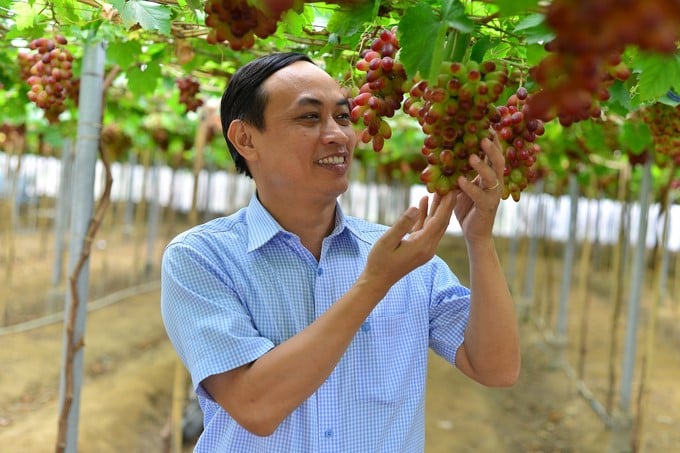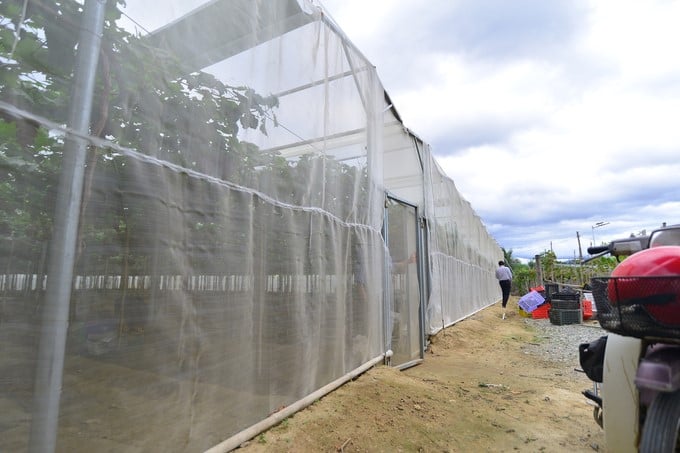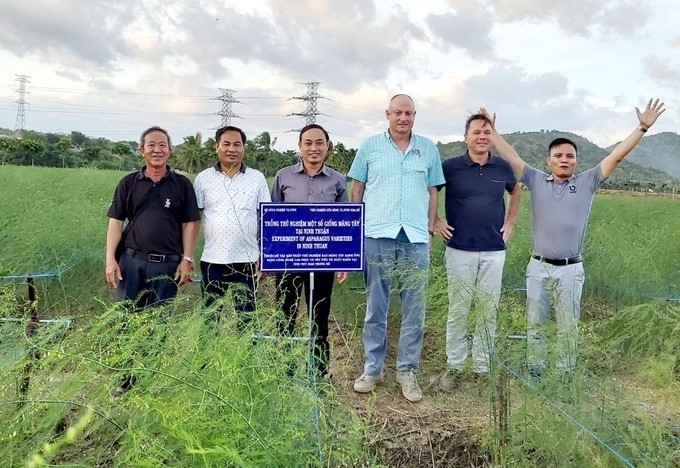June 21, 2025 | 03:14 GMT +7
June 21, 2025 | 03:14 GMT +7
Hotline: 0913.378.918
June 21, 2025 | 03:14 GMT +7
Hotline: 0913.378.918

Deputy Minister of Agriculture and Rural Development Phung Duc Tien visited a model of a new grape variety selected and created by the Nha Ho Research Institute for Cotton and Agricultural Development. Photo: MP.
The Nha Ho Research Institute for Cotton and Agricultural Development (NHAHO-RICOTAD), located in Ninh Thuan province, is a public science non-business unit under the Vietnam Academy of Agricultural Sciences (VAAS). The Institute's precursor was the Cattle Research Farm, which was established by the French in 1938. With a long history of formation and development along with a scientific career throughout, the unit has created many scientific and technical achievements, variety products, and technical processes to effectively serve the development of agricultural crop production in Vietnam, especially in the South Central Coast.
Among them are outstanding achievements in breeding with high hybrid advantage; successfully creating genetically modified crop varieties that are resistant to pests and herbicides; integrated pest management processes; production of biological products from NPV virus and Bt bacteria; organic agricultural farming processes; designing greenhouses; and building a model of agricultural development applying high technology suitable to hot and windy conditions in the Southernmost Central region.
"Since being under VAAS (in 2017), NHAHO-RICOTAD has constantly promoted scientific research, technology transfer, production activities, and scientific and technological services. During its operation, the Institute has made timely and effective contributions to meet the practical requirements for agricultural production development, especially in the South Central Coast," said Ph.D. Mai Van Hao, Director of the Nha Ho Research Institute for Cotton and Agricultural Development.

An apple variety with high yield and quality has been successfully researched and transferred to large-scale production by the Institute. Photo: M.P.
In the 2017–2023 period, NHAHO-ROCOTAD has been ordered by ministries and localities to perform 30 scientific and technological tasks at all levels, of which three are state-level, 14 are ministerial-level, and 13 are provincial-level. Accordingly, the Institute has created some crop varieties and technological processes that have been transferred for production on the South Central Coast. For example, the Institute has selected and identified crop varieties suitable for the arid South Central Coast, including six grape varieties, two apple varieties, two mango varieties, one jackfruit variety, two custard apple varieties, one guava variety, five varieties for animal feed, two green asparagus varieties, and one rice variety.
In addition, NHAHO-RICOTAD has developed and perfected 20 technical processes for the cultivation of crop varieties on the arid South Central Coast. To be more specific, the Institute has developed five technical processes for cultivation and water savings for selected promising fruit varieties suitable for drought conditions; five processes for planting, caring for, harvesting, preserving, and processing feed plants in accordance with drought conditions; and two ministerial-level technical progress processes for green asparagus plants, including the seed propagation process and the process for green asparagus cultivation, collection, and preservation with high technology application in the South Central Coast.
The Institute has also developed the integrated management process for fruit flies and some major diseases on apple trees in the South Central Coast; the process of managing rice pests by biological methods; and the process of propagating small-leaf Ming aralia by cuttings and invitro. Additionally, the Institute has developed a model of growing grapes with high-tech applications, including growing grapes in greenhouses with improved truss types, microclimate conditions, integrated crop management, soil health, etc. The purpose of the Institute’s processes and models is to improve the production efficiency, quality, and trademark of the products.

Ph.D. Mai Van Hao, Director of the Nha Ho Research Institute for Cotton and Agricultural Development, examined the new grape variety NH01-152, which has an economic value many times higher than that of normal grape varieties. Photo: M.P.
Besides, NHAHO-RICOTAD has also transferred technical advances in fruit bunching on vines, contributing to reducing damages caused by pests and improving product quality and economic efficiency for farmers. The Institute has built elite orchards of fruit trees, including grapes, apples, mango, jackfruit, custard apple, longan, and guava, to produce quality seedlings for the market. Added to that, the Institute has transferred processes for rice production, processes for safe garlic cultivation, and technical processes for intensive farming of new varieties, new hybrid maize, mung bean, etc. to the South Central Coast and the Central Highlands.
"We have also organized vocational training for farmers, training on good agricultural production practices to serve the development of some key crops for technical staff and farmers, and TOT and FFS training for technical staff of the localities in the region," said Director Mai Van Hao.
According to Ph.D. Mai Van Hao, NHAHO-RICOTAD is a unit assigned by the state to be 100% autonomous in frequent expenditures. Therefore, in parallel with scientific research, the Institute has constantly promoted business activities and provided scientific and technological services to generate revenue.
Regarding scientific and technological services, the Institute has focused on developing specialized technical services such as testing pesticides and fertilizers, testing the quality of corn and rice seeds, and supporting and consulting techniques for grape, apple, and asparagus production with high-tech applications. In terms of production and business activities, the Institute has organized the production and transfer of thousands of tons of pure rice varieties, hundreds of tons of hybrid maize, hybrid melons, and beans of all kinds to serve agricultural production on the South Central Coast and the Central Highlands.

The greenhouse system has been successfully researched by the Institute to prevent pests and serve production even in the rainy season. Photo: M.P.
Besides, the Institute has also organized the production and transfer of good seedlings for production in the arid South Central Coast, such as grape, apple, custard apple, asparagus, ming aralia, etc., with an average annual quantity of 200,000–300,000 trees.
"Production and business activities and scientific and technological services bring annual revenue to NHAHO-RICOTAD of VND 55–65 billion, paying over VND 500 million to the state budget, ensuring jobs and income for employees, supporting funding for the institute's operation of the apparatus, and supporting funding for the institute's research and development activities", said Ph.D. Mai Van Hao.
In the coming time, the Institute will prioritize investment in research, development, and transfer of new crop varieties, including fruit trees, food crops, feed crops, vegetables, medicinal plants, and industrial plants. Research biotechnology applications, high-tech agricultural application techniques, and smart agricultural technology; mechanize and automate breeding and production in order to increase agricultural labor productivity, improve value, and increase production efficiency. Increase the scale of commodity production for key crops with high economic value and potential for development in the region, especially crops for the semi-arid South Central Coast.

The Nha Ho Research Institute for Cotton and Agricultural Development focuses on researching green asparagus varieties and production processes that bring high economic efficiency. Photo: MP.
Focus on variety research and development, propagation, variety processing, transfer of crop varieties with high heat and drought tolerance, transfer of materials and technical solutions for cultivation, and accompanying pest management. This orientation aims to improve adaptability to climate change and increase agricultural production value in the arid South Central Coast and surrounding areas, serving the restructuring of the agricultural sector. Invest in the storage, exploitation, and development of genetic resources for some specific crops; build elite orchards for fruit tree varieties to serve the development and transfer of varieties into production; and develop and transfer seedlings meeting quality standards and ensuring compliance with the law.
Coordinate with domestic and foreign units to promote cooperation and transfer technical advances and scientific and technological services for specific crops, new promising plants suitable to the conditions of the country, localities, and the South Central Coast.
Ph.D. Mai Van Hao said: "Nha Ho Research Institute for Cotton and Agricultural Development is an autonomous unit with limited working capital, so it has to take a capital loan from banks every year to ensure its service and production activities. High and unstable financial charges have affected the operational efficiency of the Institute's services."
Translated by Huyen Vu Thu
![Turning wind and rain into action: [9] Digitizing hydrometeorological data in response to climate change](https://t.ex-cdn.com/nongnghiepmoitruong.vn/608w/files/news/2025/06/17/z6704423696987_15fd32ffc26d590d204d520c9dac6786-nongnghiep-165943.jpg)
(VAN) Farmers have begun accessing hydrometeorological applications to adjust their cropping schedules, aiming to ensure productivity and adapt to climate change.
![Turning wind and rain into action: [8] Real-time salinity detection and early warning technology](https://t.ex-cdn.com/nongnghiepmoitruong.vn/608w/files/news/2025/06/17/z6704423696987_15fd32ffc26d590d204d520c9dac6786-nongnghiep-151127.jpg)
(VAN) Thanks to the integration of modern hydrological-hydraulic models, remote sensing technologies, and artificial intelligence, the accuracy of hydrological forecasting has significantly improved.
![Turning wind and rain into action: [7] Early disaster warnings help marine farmers minimize losses](https://t.ex-cdn.com/nongnghiepmoitruong.vn/608w/files/news/2025/06/17/z6704423696987_15fd32ffc26d590d204d520c9dac6786-nongnghiep-142942.jpg)
(VAN) In recent years, thanks to early disaster warnings and forecasting, marine farmers in Khanh Hoa province have been able to reduce risks and losses, thereby improving production efficiency.
![Turning wind and rain into action: [6] ‘Four on-the-spot’ disaster management software](https://t.ex-cdn.com/nongnghiepmoitruong.vn/608w/files/news/2025/06/17/e5a48259d6a262fc3bb3-nongnghiep-183800.jpg)
(VAN) By simply activating the scenario on the disaster management software, the relevant authorities immediately know how many households need to be evacuated, where to evacuate them to, and by what means of transportation…
![Turning wind and rain into action: [5] Hue applies modern technology in disaster forecasting](https://t.ex-cdn.com/nongnghiepmoitruong.vn/608w/files/news/2025/06/17/z6704423696987_15fd32ffc26d590d204d520c9dac6786-nongnghiep-093938.jpg)
(VAN) In Hue city, modern technology has recently been applied in meteorological and hydrological forecasting and warning, helping to reduce the damage caused by natural disasters.

(VAN) A cutting-edge farming technique being implemented on an experimental ranch in Arizona's Sonoran Desert has already saved a billion gallons of water over five years, according to Civil Eats.

(VAN) Poultry and pig production and the environment can be boosted through enhanced water technology, according to new research.